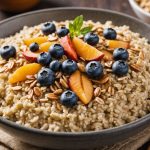Understanding the Importance of Hydration for Seniors
Hydration plays a vital role in maintaining brain health for older adults. As individuals age, their body’s ability to conserve water decreases, leading to a greater susceptibility to dehydration. This becomes particularly critical since even mild dehydration can adversely affect cognitive functions, including memory and concentration.
Dehydration in seniors can result in confusion, irritability, and a decline in mental alertness. It is important for older adults to recognize the subtle signs of dehydration and take proactive steps to maintain adequate hydration levels. By integrating a structured water intake plan, seniors can ensure they meet their daily hydration needs.
Also to see : Unlocking Better Balance: The Benefits of Dual-Task Exercises for Stroke Rehabilitation
Structured water intake plans can significantly benefit older adults by helping them remember to drink regularly throughout the day. Establishing a routine can be instrumental in preventing dehydration. This could include setting reminders to drink water, incorporating water-rich foods into meals, and keeping water accessible at all times.
Here are a few strategies to support hydration:
Also read : Transforming Stroke Recovery: The Impact of Virtual Reality Therapies on Physical Rehabilitation
- Drink a glass of water with each meal.
- Use alarms or reminders for hydration prompts.
- Include foods with high water content, like cucumbers and melons.
Focusing on these hydration strategies will help maintain brain health and overall well-being in seniors, ensuring they stay mentally sharp and physically active.
Structured Water Intake Plans
Implementing a structured water intake plan is essential for maintaining adequate hydration. These plans serve as a roadmap, helping individuals understand how to integrate sufficient water consumption into their daily routine effectively.
Key Components of Structured Water Intake Plans
A well-designed plan encompasses several key components. Firstly, it involves understanding one’s personal hydration needs. This is based on factors such as age, weight, activity level, and overall health. Additionally, identifying the most suitable type of intake plan is crucial, as it should align with an individual’s lifestyle and preferences. There’s flexibility in personalizing these plans to ensure they are practical and sustainable.
Setting Daily Water Goals
Setting clear daily water goals is fundamental to a successful intake plan. This involves determining the quantity of water needed per day, which can vary from person to person. Specific targets can facilitate consistent hydration and prevent under or overconsumption of water.
Hydration Tracking Tools
Numerous tools and apps can aid in monitoring water intake, making the implementation of a structured plan more manageable. These tools offer reminders, track progress, and adjust daily goals based on activity levels. Embracing these resources can enhance adherence to hydration goals and ultimately improve overall wellbeing.
Evidence-Based Benefits of Hydration on Brain Health
The importance of brain health cannot be overstated, and maintaining optimal hydration levels is crucial for supporting cognitive function. Research evidence has consistently highlighted the relationship between hydration and mental performance. Studies indicate that even mild dehydration can impair tasks requiring attention, memory, and motor coordination. Therefore, staying hydrated is essential for maintaining alertness and overall cognitive abilities.
Water plays a vital role in the maintenance of neural health. Being well-hydrated ensures that the brain receives adequate blood flow, oxygen, and nutrients, all of which are necessary for optimal function. Additionally, water is key for removing waste products and toxins from brain tissues. This helps prevent neuronal damage and improves overall brain health, which, in turn, strengthens cognitive function.
Memory and focus are two areas that can see significant improvement with proper hydration. Individuals who maintain adequate fluid intake often report increased levels of concentration and enhanced memory retention. Conversely, dehydration can lead to cognitive dysfunctions, such as decreased focus and impaired short-term memory.
Keeping these research-based findings in mind, adopting regular hydration routines is a simple yet effective strategy to bolster brain health and enhance mental acuity.
Practical Tips for Enhancing Hydration
Ensuring proper hydration is essential for overall health, especially in seniors, where nutrition plays a crucial role. Understanding daily habits and incorporating practical hydration tips can significantly impact overall wellbeing.
Incorporating Water-Rich Foods
Eating water-rich foods is an excellent strategy for improving hydration levels. Foods like cucumber, watermelon, and oranges are not only refreshing but boost water intake. These items can be included in daily meals or snacks, contributing to overall fluid consumption.
Establishing Routines for Hydration
Developing daily habits is key to successful hydration. Establish a routine by scheduling regular water breaks throughout the day. This structure helps maintain consistent fluid intake, supporting better hydration naturally.
Sensory Enhancements for Water Intake
Water can sometimes seem bland, especially if consumption feels like a chore. To make it more appealing, add natural flavours like lemon or mint. This sensory enhancement encourages increased water consumption and can make daily hydration feel less daunting.
By considering these practical steps, alongside senior nutrition, everyone can successfully incorporate hydration into their routine, creating daily habits that promote health and wellness.
Potential Risks and Precautions
Understanding the hydration risks associated with both excessive water intake and dehydration is crucial, especially for older adults. While staying hydrated is essential, drinking too much water can dilute blood sodium levels, leading to a condition known as hyponatremia. This condition can result in symptoms like headaches, confusion, seizures, and in severe cases, can be life-threatening.
On the flip side, identifying signs of dehydration is equally important as older adults might experience it more severely. Signs include dry mouth, fatigue, dizziness, and reduced urine output. Health precautions can be taken by encouraging regular water intake throughout the day rather than waiting until feeling thirsty, which is a lagging indicator of dehydration.
Moreover, individual health conditions affecting hydration must be considered. Certain medications may alter the body’s ability to maintain water balance. Health conditions like heart disease, kidney issues, or medication that affects fluid balance should be discussed with a healthcare provider to tailor hydration needs appropriately.
By addressing these hydration risks and implementing health precautions, older adults can maintain a balanced fluid intake that supports their overall wellbeing.
Expert Opinions and Anecdotal Evidence
Exploring the world of hydration, particularly in senior care, it becomes essential to rely on expert interviews and testimonials to better understand effective hydration practices.
Interviews with Nutritionists and Geriatric Experts
Experts in nutrition and geriatrics consistently highlight the importance of maintaining proper hydration levels to promote overall health in the elderly. Their insights emphasize several tailored strategies to ensure seniors stay hydrated:
- Adequate fluid intake at regular intervals
- Incorporation of hydrating foods like fruits and vegetables
- Monitoring water intake to prevent dehydration risks
These practices are not only fundamental but essential to improving quality of life in seniors.
Success Stories from Caregivers
Many caregivers have shared success stories where improved hydration practices significantly enhanced the well-being of those under their care. Simple adjustments, such as setting reminders for water breaks or making soups a part of the daily diet, have shown remarkable results in maintaining hydration levels.
Common Misconceptions About Senior Hydration
Despite its importance, common misconceptions about hydration persist. A significant myth is that seniors only need minimal water because of less activity. Experts firmly debunk this, stressing that reduced thirst does not equate to reduced need. By addressing these myths, caregivers can make informed decisions and refine hydration practices for better health outcomes.
Reviewing Studies and Statistics
Research studies consistently highlight the profound impact that hydration can have on senior health statistics. A comprehensive study by the National Institutes of Health revealed that adequate hydration significantly improves cognitive function in older adults. It’s no surprise then, that hydration is closely linked to a reduction in risks associated with brain diseases.
Hydration data further supports these findings by illustrating a clear correlation between fluid intake and improved brain health. For instance, seniors who maintain sufficient hydration levels are reported to have sharper memory and better concentration, due to enhanced brain functionality.
Now, considering these insights, the importance of implementing more detailed research studies can’t be overstated. Current findings signal the need for extensive exploration into the specific volumes and types of fluids that optimize mental acuity. Equally, the development of educational programs aimed at raising awareness about staying hydrated among seniors is becoming crucial.
In conclusion, the statistics and studies are compelling, yet further research and reading are essential. The road to improved senior health statistics lies in continuously updating our understanding and adapting our health advice to meet the growing body of hydration data. Thereby, providing holistic and informed guidance for older adults in maintaining their cognitive health.











